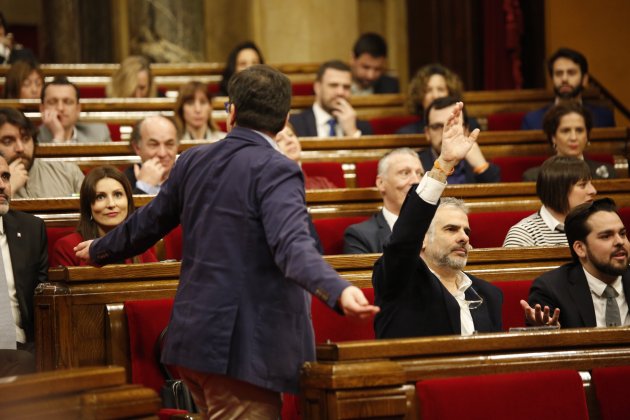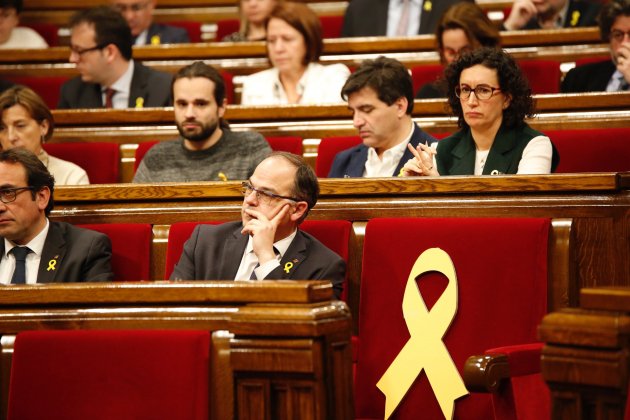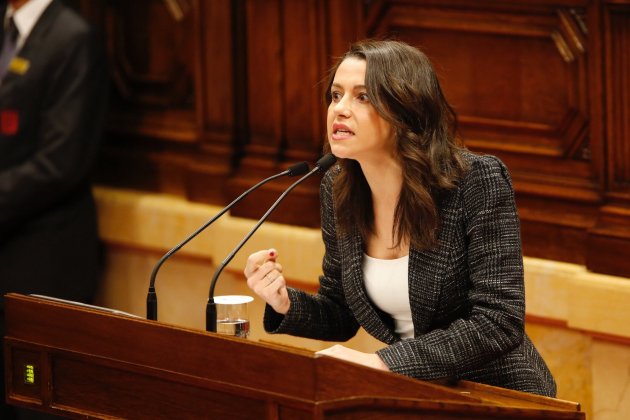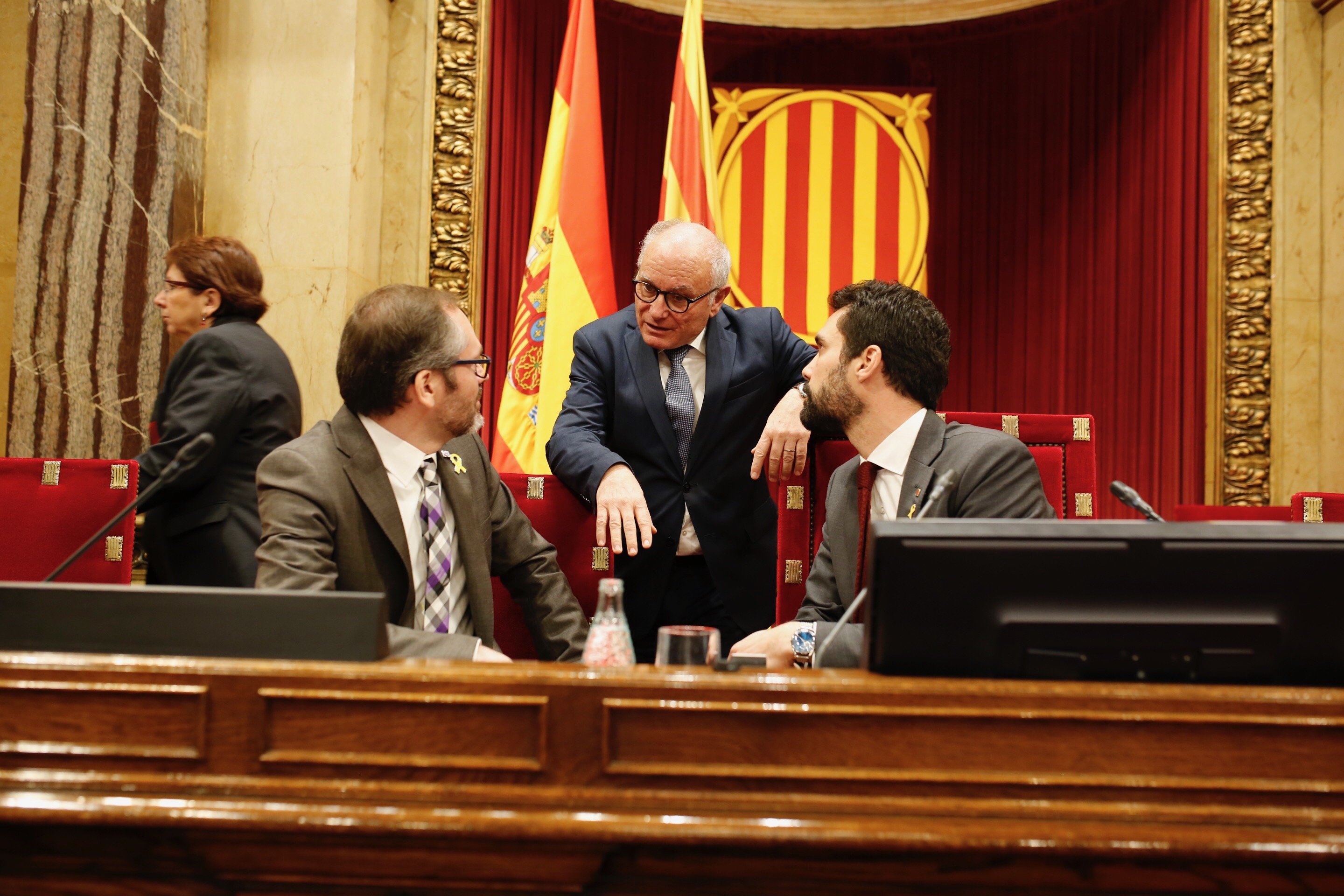The Catalan Parliament's first plenary session of this legislature has seen a repeat of the tension seen at the end of the last one. The motion proposed by JxCat to restore president Carles Puigdemont and the Catalan institutions and, more specifically, CUP's amendments invoking last year's proclamation of the republic caused a delay of over an hour to the start of the session whilst the Parliament's Bureau and Board of Spokespeople deliberated. Once again, threats of legal actions were wielded for having accepted to consider the amendments which, according to pro-union groups, contravene Constitutional Court statements. In the end, a proposal agreed between JxCat and the CUP was passed with their votes and those from ERC, the other pro-independence party. The Parliament has expressed recognition of president Puigdemont's legitimacy, but avoided alluding to the proclamation of the republic to avoid legal backlash.
Before voting on the last point of the restoration motion, defending the result of the 1st October referendum, the Bureau's second deputy speaker, David Pérez (PSC), explained the arguments against it being considered based on Constitutional Court statements. This was followed by CUP spokesperson Carles Riera, calling for it to be read anyway. It was approved 68 votes in favour, 8 against and no abstentions.
The plenary session started with a bitter debate between the speaker, Roger Torrent, and Ciutadans, based on their petition to reconsider the vote on the text agreed between JxCat and the CUP. Torrent argued that the vote couldn't be reconsidered because the decision, given that it was a modification of a previous proposal, hadn't passed through the Bureau. After some back and forth, during which the second deputy speaker, José María Espejo-Saavedra (Ciutadans), left his seat with Bureau to debate Torrent from his party's seats, the plenary session started.
Ciutadans, in the end, didn't take part in the vote in protest of their reconsideration request not having been attended to and with a battery of criticisms from their leaders, Inés Arrimadas, against the speaker. Previously, their spokesperson called, unsuccessfully, for the chamber's lawyers' warning against the violation of Constitutional Court decisions the initiatives could involve to be made public.

Deputy Quim Torra (JxCat), defended his party's motion, starting by noting the absence of members of the government and pro-independence organisations forced by imprisonment or exile. He said that the motion wants to reject any authoritarian drift by the Spanish state and to express loyalty to the ballot boxes. "This motion is the starting point of the republican project we want for the people of Catalonia," he said.
Torra warned that, during the 1st October referendum, everyone could see how anyone's most basic rights would be attacked. He denounced a "suffocating climate of terror" caused by the Spanish state and its legal persecution and expressed solidarity with all those suffering from it, to applause from pro-independence deputies, but not from Catalunya en Comú-Podem or the pro-union parties. "No one will shut us up", he said, insisting that the independence cause is "just, legitimate and honourable".
The deputy mentioned the historical presidents of Catalonia who suffered prison or exile, including Jordi Pujol, to protests from the pro-union seats. "I would ask for respect towards those who went to prison during the Franco era for defending democratic liberties," he said.

ERC's secretary general, Marta Rovira, defended a "full republic" and said that independence is a means to achieve this. "We've come further than ever, with more social support than ever, and we've reached the conviction that however many ballot boxes they put out we would win again", she said, in a speech that also defended the 1st October referendum.
For Rovira, article 155 has decapitated the government and hit the Catalan institutions, "it was the pretext to intervene in Catalonia". "They're doing it intelligently and silently", she said at the same time as warning that the country's model, "of a single people", was under attack, for which reason there is no other recourse than "to end with this dictatorship as soon as possible".
Rovira, however, didn't avoid self-criticism. "Too often we've treated the public with paternalism and it's mature enough", she admitted. To rectify this, she called for more collective intelligence and for them to be "stronger and franker than ever".
Carles Riera (CUP) also had criticisms. He expressed regret that, after the proclamation of the republic on 28th October last year, the government left, ignoring the people, and the Parliament was dissolved, and he accused the Spanish state of having renounced the rule of law. "Anything goes", he said, warning that the state's response is repression and recentralisation.
Riera, despite announcing CUP's support for JxCat's motion, criticised that on the day Puigdemont's investiture debate was to be held, his party's four deputies were alone in their seats. "The problem is that you have renounced making this investiture effective," he said.

Inés Arrimadas, leader of Ciutadans, accused Torrent of not being brave enough to stand up and admit that they were ignoring Constitutional Court resolutions. "And later, in front of the judges, everything was symbolic. Enough farces!", she said.
Arrimadas accused the independence process of having become a modus vivendi, a way of life. "They won't give them an independent Catalan republic, they should stop lying to their voters and lacking respect to ours", she said as well as expressing regret over the families being divided and businesses being lost. She did, however, give thanks to the independence movement for having awoken Spanish civic "patriotism" and having set off alarms in Europe.
In her second turn, she directly confronted Rovira, noting that Ciutadans was the largest party following the latest election. "That's no long a political topic. It's another area. It's now a problem with reality. Ciutadans won the election, something which you've never done".
Miquel Iceta (PSC) criticised that they have had to fight against an investiture and government at a distance, and rejected the idea of an imprisoned president, referring to Jordi Sànchez. "Today we still don't know how many presidents we'll have, how many will be real and how many will be playing at it", he said sarcastically, continuing to suggest that it sometimes seems there is more worry as to who will head up TV3, Catalan public TV, than the government.
He warned that "it doesn't make sense to defend a republic which wasn't born" and instead left "the government intervened in and the society divided". Iceta defended his group's no vote to JxCat's motion because it contains too many ideas they would like to forget and overcome.
The leader of Catalunya En Comú-Podem, Xavier Domènech, warned that although Jordi Sànchez has full rights to be invested president, if the Catalan government is used to denounce an abnormal democratic situation, it would be a "self-boycott" of Catalonia.
"No restoration is possible, for a very basic reason: today is no longer yesterday", he warned, "they speak of legitimacies but the country needs a future, not just a past".
In short, it was a rough plenary session. That said, there were hints of calmer waters with Quim Torra inviting Eva Granados (PSC) to a coffee and Inés Arrimadas making the same offer to Marta Rovira, leading to Alejandro Rodríguez (PP) making his own suggestion of a coffee to Torra, once the latter had finished the one due with Granados.

